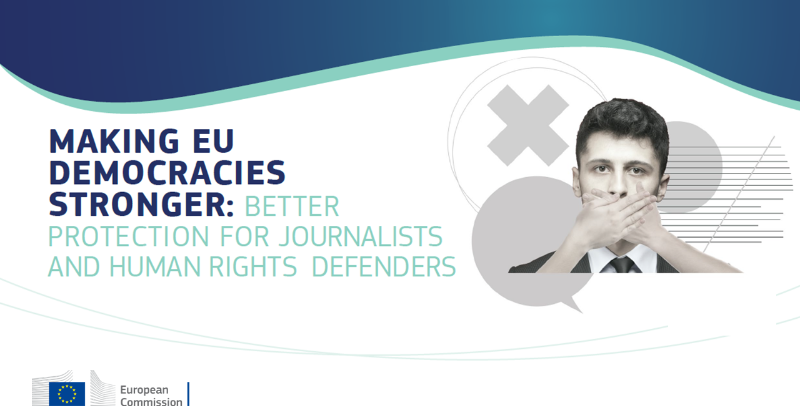
The European Commission has taken action to improve the protection of journalists and human rights defenders from abusive court proceedings. Strategic lawsuits against public participation, commonly known as ‘SLAPPs', are a particular form of harassment used primarily against journalists and human rights defenders to prevent or penalise speaking up on issues of public interest.
The proposed Directive covers SLAPPs in civil matters with cross-border implications. It enables judges to swiftly dismiss manifestly unfounded lawsuits against journalists and human rights defenders. It also establishes several procedural safeguards and remedies, such as compensation for damages, and dissuasive penalties for launching abusive lawsuits.
The Commission is also adopting a complementary Recommendation to encourage Member States to align their rules with the proposed EU law also for domestic cases and in all proceedings, not only civil matters. The Recommendation also calls on Member States to take a range of other measures, such as training and awareness raising, to fight against SLAPPs.
Proposal for an EU law against SLAPPs
The proposed Directive provides courts and targets of SLAPPs with the tools to fight back against manifestly unfounded or abusive court proceedings. The proposed safeguards will apply in civil matters with cross-border implications. The safeguards are expected to benefit in particular journalists and persons or organisations engaged in defending fundamental rights and a variety of other rights, such as environmental and climate rights, women's rights, LGBTIQ rights, the rights of the people with a minority racial or ethnic background, labour rights or religious freedoms, but all persons engaged in public participation on matters of public interest are covered.
The safeguards have been targeted to ensure the balance of access to justice and privacy rights with the protection of freedom of expression and information.
The main elements of the proposal are:
- Early dismissal of a manifestly unfounded court proceedings – courts will be able to take an early decision to dismiss the proceedings if a case is manifestly unfounded. In such a situation, the burden of proof will be on the claimant to prove that the case is not manifestly unfounded;
- Procedural costs – it will be for the claimant to bear all the costs, including the defendant's lawyers' fees, if a case is dismissed as abusive;
- Compensation of damages – the target of SLAPP will have a right to claim and obtain full compensation for the material and immaterial damage;
- Dissuasive penalties – to prevent claimants from starting abusive court proceedings, the courts will be able to impose dissuasive penalties on those who bring such cases to the court.
- Protection against third-country judgements – Member States should refuse recognition of a judgment coming from a non-EU country, against a person domiciled in a Member State, if the proceedings would be found to be manifestly unfounded or abusive under the Member State's law. The target will also be able to ask for compensation of the damages and the costs in a Member State where he or she is domiciled in.
Recommendation for Member States
The Commission Recommendation also adopted today complements the Directive and encourages Member States to ensure that:
- National legal frameworks provide the necessary safeguards, similar to those at EU level, to address domestic cases of SLAPPs. This includes ensuring the procedural safeguards of an early dismissal of manifestly unfounded court proceedings. Member States would also need to ensure that their rules applicable to defamation, which is one of the most common grounds for launching SLAPPs, do not have an unjustified impact on the freedom of expression, on the existence of an open, free and plural media environment, and on public participation.
- Training is available for legal professionals and potential SLAPP targets to improve their knowledge and skills to effectively deal with these court proceedings. The European Judicial Training Network (EJTN) will be involved to ensure coordination and that information is disseminated in all Member States;
- Awareness raising and information campaigns are organised, so that journalists and human rights defenders do recognize when they are facing a SLAPP;
- Targets of SLAPP have access to individual and independent support, such as from law firms that defend SLAPP targets pro bono;
- Aggregated data collected at national level on manifestly unfounded or abusive court proceedings against public participation is reported to the Commission on a yearly basis, starting as of 2023.
Next Steps
The proposed Directive will have to be negotiated and adopted by the European Parliament and the Council before it can become EU law.
The Commission Recommendation is directly applicable. Member States will need to report on implementation to the Commission 18 months after adoption of the Recommendation.
More information:
The Commission proposal for a Directive
Coalition Against SLAPPs in Europe (CASE)
Details
- Publication date
- 27 April 2022
- Author
- Representation in Ireland
